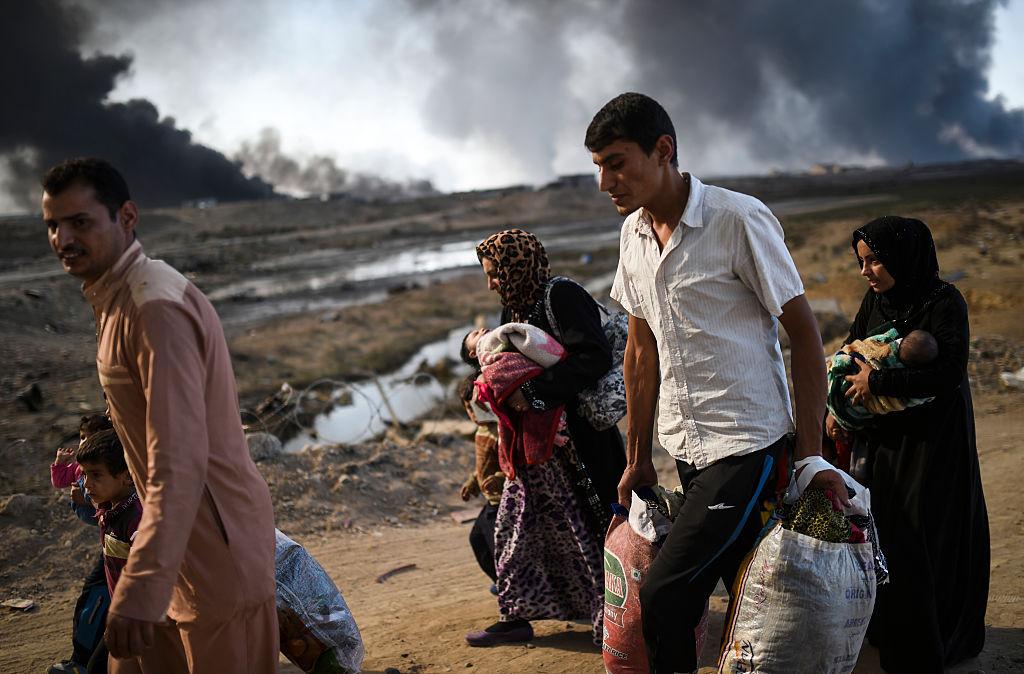Fighting rages near Mosul as Isis forcibly moves thousands for use as human shields
Militants try to bus 25,000 people into the city centre to protect key sites, UN says, as reports emerge 40 former members of the security forces shot and bodies thrown in Tigris

Your support helps us to tell the story
From reproductive rights to climate change to Big Tech, The Independent is on the ground when the story is developing. Whether it's investigating the financials of Elon Musk's pro-Trump PAC or producing our latest documentary, 'The A Word', which shines a light on the American women fighting for reproductive rights, we know how important it is to parse out the facts from the messaging.
At such a critical moment in US history, we need reporters on the ground. Your donation allows us to keep sending journalists to speak to both sides of the story.
The Independent is trusted by Americans across the entire political spectrum. And unlike many other quality news outlets, we choose not to lock Americans out of our reporting and analysis with paywalls. We believe quality journalism should be available to everyone, paid for by those who can afford it.
Your support makes all the difference.Isis is trying to move up to 25,000 people into Mosul as the jihadis prepare for what is likely to be an intense battle for control of the city now Iraqi coalition forces have reached its outskirts.
Fighters tried to transport thousands of people on trucks and minibuses from Hammam al-Alil, south of Mosul, to the city under cover of darkness in the early hours of Monday, UN spokesperson Ravina Shamdasani told reporters in Geneva on Tuesday, citing credible sources in the field.
They were most likely being moved to protect Isis military bases, she said, although at least some trucks were forced to turn back because of the threat from patrolling US-led coalition aircraft.
Isis also executed 40 former police officers over the weekend, throwing their bodies into the Tigris river in the latest attempt to quell rebellion against the group’s two-year-rule as Iraqi forces edge closer.
Elite Counter Terrorism Service units had entered the city proper in a dawn offensive on Tuesday, fighting their way towards the city centre in what marks the first time Iraqi troops have set foot in the country’s second largest urban centre since the army’s humiliating defeat by Isis in 2014.
The US-trained special forces teams entered Gogjali, a neighborhood just inside Mosul's administrative limits, and by midday were only 800 metres away from the more built-up Karama district, according to Major General Sami al-Aridi of the Iraqi special forces.
“[We] have stormed in,” he said. “[Isis] is fighting back and have set up concrete blast walls to block off the Karama neighborhood and our troops' advance,” he added, noting that landmines had been set along the road into the city too.
Tuesday’s advance on Mosul involving Iraqi artillery, tank and machine gun fire was aided by US coalition air strikes. Isis lit fires so smoke would obscure targets, and used guided anti-tank missiles and small arms fire in response.
The two-week-old offensive to liberate Mosul - home to some 1.5million people at risk from crossfire - is likely to be long and gruelling, with fighting expected to go from house-to-house and street-to-street.
Residents inside the city have reported the estimated 4,000 fighters are well prepared for battle with an extensive network of tunnels, primed suicide bombers and extensively rigged roads and bridges designed to slow the Iraqi advance.
Troops are still some six miles (10 kilometres) from the city centre.
Meanwhile on Tuesday, villagers from Bazwaya, liberated yesterday, were seen fleeing from their homes, carrying white flags to signal their civilian status and driving sheep in front of them in an attempt to leave before fighting intensifies.
Brigadier General Haider Fadhil of the Iraqi special forces said that Iraqi forces planned to evacuate as many people as possible to an official camp for those displaced by the assault.
Between 200,000 - 700,000 people are expected to try and leave Mosul now that the battle has reached the city’s edges, in what several humanitarian groups and the UN’s aid agency have warned could be a “blood bath” unless proper humanitarian corridors are set up for civilians.
Isis has been corralling residents into certain areas of the city to protect strategic sites and blocking off others with concrete blast walls, a tactic they have previously used in Fallujah, Kobani, and several other of their lost strongholds across Iraq and Syria.
Mosul is Isis’ last bastion in Iraq, but arguably its most important: it is four to five times the size of the other urban centres that once made up its caliphate.
Join our commenting forum
Join thought-provoking conversations, follow other Independent readers and see their replies
Comments